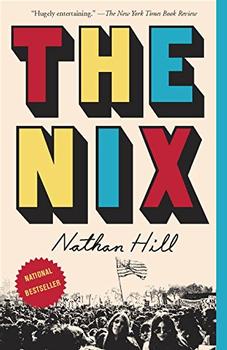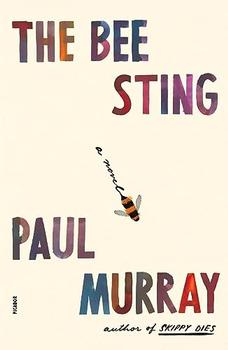Summary | Excerpt | Reading Guide | Reviews | Beyond the book | Read-Alikes | Genres & Themes | Author Bio

Samuel Andresen-Anderson has mommy issues – and he does a pretty bad job of hiding it too. So while his daytime hours are spent at a local liberal arts college teaching literature to entitled millennials who would rather spend more time arguing about the finer points of plagiarism than write yet another essay about Hamlet, Sam drowns his leisure hours playing Elfquest, an online role-playing game where his avatar is the coolest and most revered among his fellow gamers. Yes, he accepts, he has become "one of those guys who spends his Friday nights playing video games."
But there are reasons for his mindless stupor: First, Sam is using the game as a diversion tactic from the task that looms large – he has to deliver on a promise to a publisher and produce a great novel. Second, his seemingly mundane plod hides a deep-rooted sense of inadequacy developed mostly as a result of being abandoned by his mother when he was just a boy. "In his fantasies of reunion, his mother always begs his forgiveness and he does not cry. That's how it goes every time."
So imagine Sam's surprise when one day he sees his mother, Faye, on television at the center of a political firestorm. She throws a fistful of gravel at a controversial Republican governor considering a run for the Presidency, and is suddenly catapulted into the spotlight. Who is this enigmatic figure, the public wants to know – and for that matter, so does Sam. He eventually strikes a deal with his publisher: he will write a nasty and brutal tell-all about his mother the "terrorist" and wriggle out of his publishing commitment. As can be imagined, this seemingly easy task becomes fraught with emotional baggage as Sam meets his mother after decades and tries to reconcile their fractured past.
The Nix of the book's title derives from the name of a Norwegian spirit, one that makes you hurt the people you love the most; a spirit that suffocates Faye's childhood and, as it turns out, is a relic carried from the old country by her stoic father. What tragedies did Faye have to endure as a child that made her feel abandoning her son was the only way out? What metaphorical ghosts haunted her own father that followed him to the New World? These are the weighty questions that haunt this debut novel and are teased out with meticulous care.
Hill's astute powers of comedic detail are reflected in the most quotidian observations:
This is what you get in the suburbs...the satisfaction of small desires. The getting of things you didn't even know you wanted. An even larger grocery store. A fourth lane. A bigger, better parking lot. A new sandwich shop or video-rental store. A McDonald's slightly closer than the other McDonald's. A McDonald's next door to a Burger King, across the street from a Hardee's, and the same lot as a Steak 'N Shake and a Bonanza and a Ponderosa all-you-can-eat smorgasbord thing. What you get in other words is choice. Or rather the illusion of choice she said, all these restaurants offering substantially the same menu, some slight variation on potatoes and beef.
Despite being peppered with strong writing and moments of pathos and comedy, The Nix eventually starts to teeter under the weight of its own grand ambitions. We learn early on that Faye was a radical in the '60s, that she did something momentous that caused her to leave college and return home to Iowa, a beaten down soul. Hill builds this secret up so much and draws it out to such a great extent that by the time the reveal rolls around, we either don't care or are let down by what doesn't seem like that jaw-dropping a transgression. A fair number of run-on passages could have been trimmed – while Hill is at his funniest when describing the effects of video gaming, do we really need to hear every excruciating detail about what happens when one is glued to a computer 24-7? A critical part of the novel describes the Chicago political protests of 1968, yet this section misses its rhythm. The writing feels less organic here and stiff, making the product as a whole a tad uneven.
But never mind these hiccups. In the end, Nathan Hill has crafted an impressive debut, which is a polished showcase for his sensitivity and humor. The Nix is audaciously ambitious in its agenda and sweep. Will it be the next Great American Novel? Not quite, but it comes close. Very close.
![]() This review was originally published in The BookBrowse Review in September 2016, and has been updated for the
May 2017 edition.
Click here to go to this issue.
This review was originally published in The BookBrowse Review in September 2016, and has been updated for the
May 2017 edition.
Click here to go to this issue.

If you liked The Nix, try these:

by Lucas Schaefer
Published 2025
For readers of Jonathan Franzen and Nathan Hill comes a haymaker of an American novel about a missing teenage boy, cases of fluid and mistaken identity, and the transformative power of boxing.

by Paul Murray
Published 2024
From the author of Skippy Dies comes Paul Murray's The Bee Sting, an irresistibly funny, wise, and thought-provoking tour de force about family, fortune, and the struggle to be a good person when the world is falling apart.
Your guide toexceptional books
BookBrowse seeks out and recommends the best in contemporary fiction and nonfiction—books that not only engage and entertain but also deepen our understanding of ourselves and the world around us.